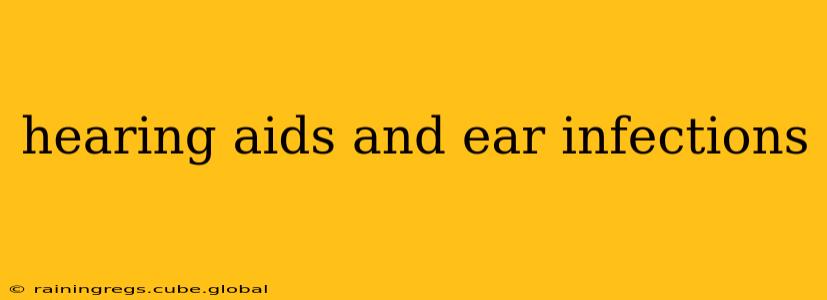Hearing aids can significantly improve the quality of life for millions, but concerns about ear infections often arise. This comprehensive guide explores the relationship between hearing aids and ear infections, addressing common questions and providing valuable insights for users and healthcare professionals.
Can Hearing Aids Cause Ear Infections?
This is a common concern. While hearing aids themselves don't directly cause ear infections, they can create an environment that's more conducive to their development. The moist environment inside the ear canal, coupled with the presence of the hearing aid, can trap moisture and debris, leading to an increased risk of infection. This is particularly true if the hearing aid isn't properly cleaned and maintained. Bacteria and fungi thrive in warm, moist areas, and a poorly maintained hearing aid can become a breeding ground.
What are the signs of an ear infection related to hearing aid use?
Recognizing the signs of an ear infection is crucial for prompt treatment. Common symptoms include:
- Pain or discomfort in the ear: This is often a sharp, throbbing pain.
- Discharge from the ear: This may be pus-like, clear, or bloody.
- Itching in the ear: Persistent itching can be a sign of irritation or infection.
- Hearing changes: A sudden decrease in hearing, beyond what's expected with hearing loss, could indicate an infection.
- Feeling of fullness or pressure in the ear: This can accompany pain and discomfort.
- Fever: A fever is a more serious indicator of infection and requires immediate medical attention.
- Redness or swelling around the ear: This can be visible, particularly in outer ear infections.
How can I prevent ear infections with hearing aids?
Preventing ear infections is key to comfortable hearing aid use. Here's how:
- Proper cleaning: Daily cleaning is vital. Follow your audiologist's instructions carefully. This usually involves wiping the hearing aid with a dry, soft cloth and using specialized cleaning tools and solutions as recommended. Never use water directly to clean your hearing aid unless specifically advised by your audiologist.
- Drying your ears: After showering or swimming, carefully dry your ears thoroughly. Consider using a hairdryer on a low setting to gently remove excess moisture.
- Regular check-ups: Schedule regular appointments with your audiologist for professional cleaning and assessments.
- Proper fitting: Ensure your hearing aid fits correctly. An ill-fitting hearing aid can trap moisture and debris more easily.
- Using earplugs: When swimming or showering, consider using custom-fit earplugs to protect your ears and hearing aid.
- Maintaining good hygiene: Good overall hygiene helps prevent infections. Wash your hands frequently, especially before handling your hearing aids.
What types of ear infections are common with hearing aid use?
Hearing aid users are more susceptible to:
- Otitis externa (swimmer's ear): This is an infection of the outer ear canal.
- Otitis media (middle ear infection): While less directly linked to hearing aids, existing middle ear issues can be exacerbated by trapped moisture leading to an infection.
Are there specific hearing aid types less likely to cause ear infections?
While all hearing aids carry a slightly increased risk, open-fit hearing aids, which don't completely block the ear canal, may slightly reduce the risk of moisture buildup compared to completely-in-canal (CIC) or in-the-ear (ITE) styles. However, diligent cleaning remains crucial regardless of the type of hearing aid.
What should I do if I suspect an ear infection?
If you suspect an ear infection, contact your doctor or audiologist immediately. Early treatment is crucial to prevent complications. They can properly diagnose the infection and prescribe the appropriate treatment, which may include antibiotic ear drops or oral antibiotics. Do not attempt to self-treat.
How are ear infections treated?
Treatment will depend on the type and severity of the infection. Your doctor might prescribe antibiotic ear drops, oral antibiotics, or pain relievers. In some cases, they might recommend removing the hearing aid until the infection clears up.
This information is for general knowledge and does not constitute medical advice. Always consult with a qualified healthcare professional for any health concerns or before making any decisions related to your health or treatment. Remember, proactive cleaning and regular check-ups are your best defense against hearing aid-related ear infections.
